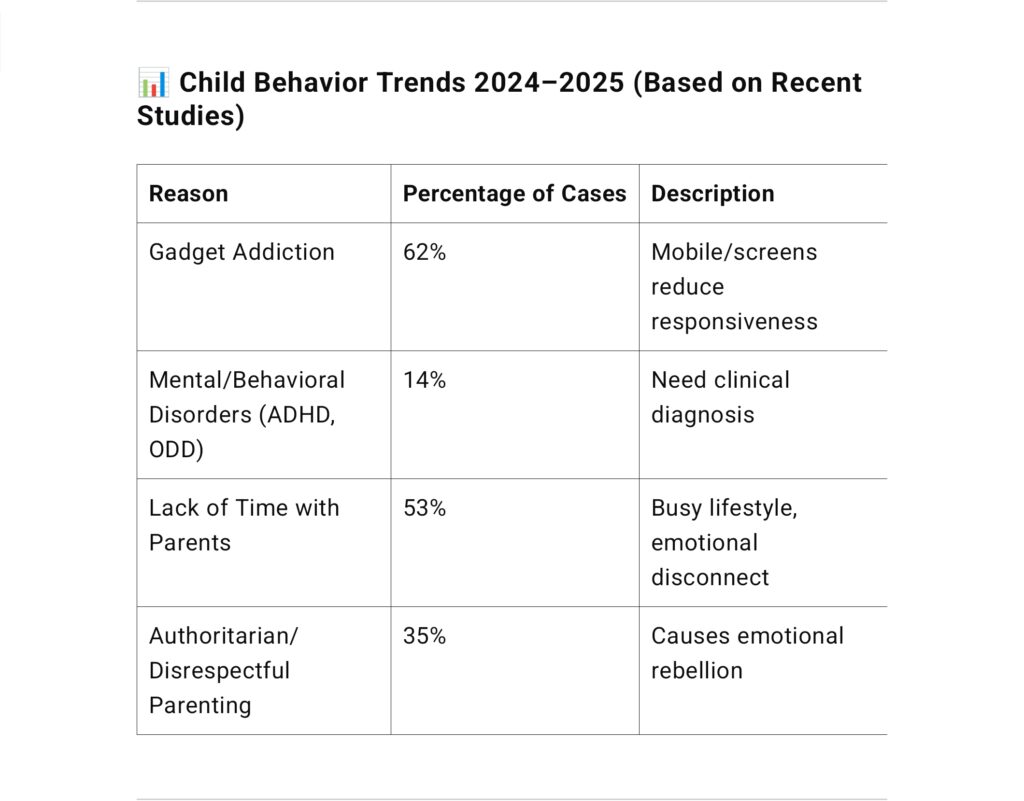Dr. keshavulu Bashavathini.MD. psy. Osm. Senior Neuro – Psychiatrist.
Children’s disobedience or non-compliance has become a rising concern among modern parents. Based on recent studies (2024–2025) in child psychology, parenting behavior, and behavioral disorders, here is a comprehensive analysis of why children today are not listening to their parents:
🔍 Latest Reasons – Explained
- Excessive Use of Gadgets & Screen Time
Smartphones, tablets, TVs, and gaming devices consume children’s full attention.
Platforms like YouTube, Instagram Reels, TikTok, and video games offer instant gratification, reducing kids’ patience and responsiveness to parents.
This creates a dopamine loop – unless something feels instantly rewarding, they don’t respond.
- Authoritarian Parenting Style
Commands like “Do as I say or else…” may work temporarily through fear but create long-term resistance.
Lack of empathy and warmth in communication leads to emotional detachment and defiance.
- Overload of Instructions
Constant “Don’t do this, don’t touch that, sit properly, don’t speak like that” leads children to tune out parental voices over time.
The brain starts filtering commands as noise.
- Struggle for Autonomy
Children naturally start asserting independence.
If parents don’t respect their opinions or don’t involve them in decisions, kids rebel or stop listening.
- Lack of Quality Time
Busy work lives and digital distractions mean parents spend less meaningful time with children.
Emotional disconnect leads children to seek validation elsewhere and ignore parental voices.
- Underlying Psychological or Behavioral Issues
Conditions like ADHD, Oppositional Defiant Disorder (ODD), Learning Disabilities, or emotional dysregulation can cause children to appear non-cooperative.
These children need professional psychological evaluation and support, not punishment.
- Parental Hypocrisy
If parents say “Don’t use the phone too much” while using phones themselves constantly, children see the double standards and lose respect for instructions.
- Peer Pressure & External Influence
Friends at school or neighborhood often influence behavior more than parents.
Children mimic peer behavior and may consider parents “old-fashioned.”
📊 Child Behavior Trends 2024–2025 (Based on Recent Studies) :

✅ What Can Be Done – Practical Solutions
- Spend Quality Time
At least 30 minutes daily of undivided attention (not just studies) can rebuild emotional trust.
- Change Your Communication Style
Instead of ordering, ask questions or offer suggestions.
E.g., “Would you like to help me with this?” or “What do you think we should do?”
- Set Gadget Limits (and Model It Yourself)
Children imitate. If you put your phone down during meals or bedtime, they’ll learn too.
- Be a Role Model
Practise what you preach. Children are keen observers and follow what you do more than what you say.
- Discipline with Calmness
Avoid yelling. Try to understand the reason behind their behavior instead of reacting immediately.
- Assign Responsibilities
Small tasks like setting the table, organizing books, or helping siblings make them feel respected and accountable.
🧠 Final Thought – A Parent’s Reflection
“A child’s behavior is a reflection. What they hear, see, and feel – that’s what they mirror back.”
Understanding must come before correction.








